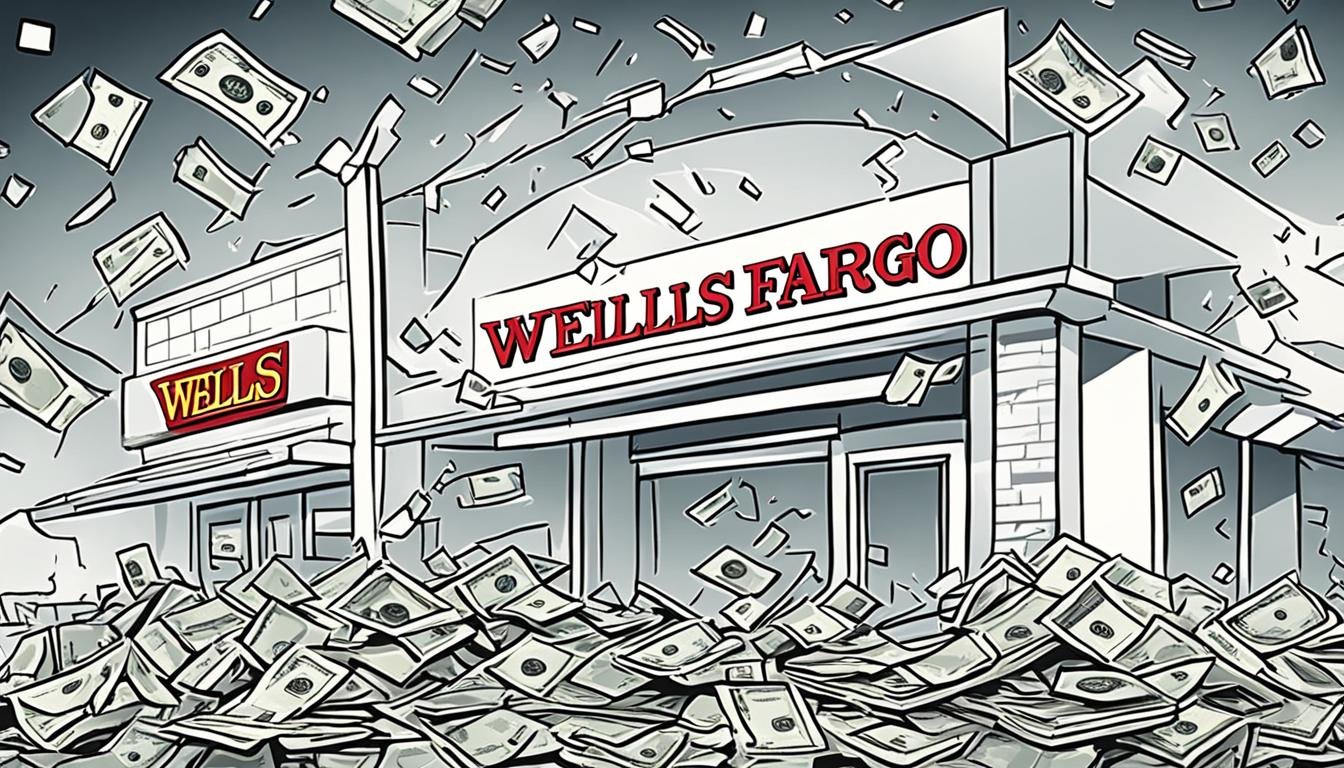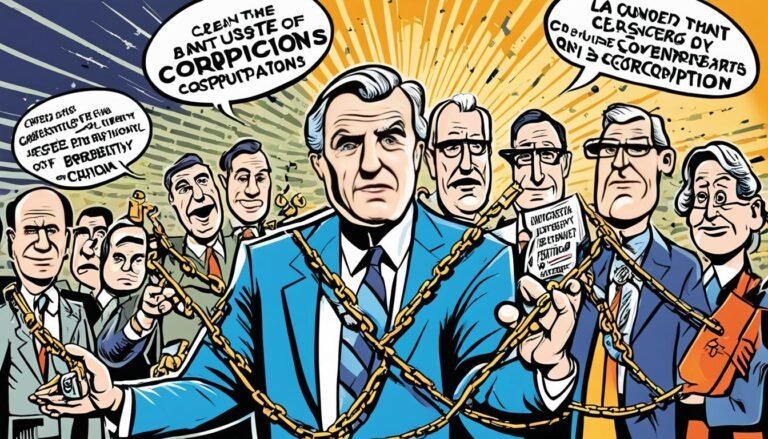Wells Fargo’s Account Fraud Scandal: A Case Study in Ethics
Wells Fargo, one of the largest financial institutions in the United States, found itself mired in a scandal that shook the banking industry. It was revealed that employees had been opening fraudulent accounts without customers’ knowledge or consent, leading to severe ethical repercussions. This case study delves into the Wells Fargo account fraud scandal, examining the ethical challenges it presented and the lasting impact on corporate ethics.
Key Takeaways:
- Unethical practices within corporations can have far-reaching consequences.
- The culture of incentive gaming can incentivize employees to engage in fraudulent activities.
- Factors such as a fear of job loss and a culture rewarding sales performance contributed to the prevalence of fraudulent accounts.
- The Wells Fargo scandal highlights the importance of striking a balance between corporate culture and individual accountability.
- Entangled incentives and conflicts of interest can lead employees to compromise ethics in pursuit of financial rewards.
The Culture of Incentive Gaming
In an attempt to meet unrealistic sales goals, Wells Fargo employees resorted to incentive gaming. The company culture and compensation structure encouraged employees to open fraudulent accounts and apply for unauthorized credit cards.
“The focus was always on meeting sales targets, and that pressure trickled down from management. We were constantly pushed to cross-sell products and increase our numbers. It became a cutthroat environment where employees felt compelled to engage in unethical practices to keep their jobs.”
Former employees reported immense pressure and unrealistic sales targets that drove them to engage in unethical practices. The culture of incentive gaming created an environment where employees felt they had no choice but to resort to fraudulent activities to meet the company’s expectations.
The Impact of Compensation Structure
The compensation structure at Wells Fargo played a significant role in incentivizing unethical behavior. Employees were rewarded based on their sales performance, with higher sales numbers leading to bonuses and promotions. This created a strong financial motivation for employees to open fraudulent accounts and engage in deceptive practices.
The unrealistic sales goals combined with the financial incentives created a toxic culture that valued results above ethical conduct.
Unrealistic Sales Targets and Pressure
Wells Fargo’s sales targets were often unattainable, placing immense pressure on employees. The fear of not meeting these targets and the threat of job loss in a tough economy drove employees to resort to fraudulent activities.
“I knew what I was doing was wrong, but I felt trapped. The pressure to meet sales goals was relentless, and I couldn’t afford to lose my job. It was a choice between my own well-being and doing the right thing.”
Many employees felt caught between a rock and a hard place, facing the dilemma of prioritizing their own financial stability over ethical considerations.
The image above illustrates the detrimental impact of incentive gaming and the pressure to meet unrealistic sales goals on the overall corporate culture and ethical standards within Wells Fargo.
Factors Leading to Employee Fraud
Multiple factors played a role in driving Wells Fargo employees to cheat customers. The pressure to meet sales goals, fear of losing their jobs in a tough economy, and a culture that rewarded sales performance all contributed to the prevalence of fraudulent activities.
Employees felt immense pressure to meet unrealistic sales targets, which pushed them to resort to unethical practices. The fear of job insecurity in a challenging economic climate further exacerbated their willingness to engage in fraudulent activities.
The culture within Wells Fargo that emphasized rewarding sales performance without sufficient focus on ethical behavior also played a significant role. Employees were motivated to prioritize sales targets over customer trust, leading to the creation of fraudulent accounts and unauthorized credit cards.
To better understand the factors contributing to employee fraud, let’s explore each in detail:
The Pressure to Meet Sales Goals
Wells Fargo set aggressive sales goals for its employees, pressuring them to meet and exceed targets. The relentless drive for higher sales numbers often overshadowed ethical considerations and created an environment where employees felt compelled to engage in fraudulent activities to meet those goals.
Fear of Job Insecurity
During the time of the fraudulent activities, the economy was facing significant challenges. Wells Fargo employees feared losing their jobs in an uncertain job market, which further amplified the pressure to meet sales targets. This fear factor influenced their decision-making and increased their willingness to engage in unethical practices.
A Culture that Rewarded Sales Performance
The corporate culture at Wells Fargo prioritized sales performance and rewarded employees based on their ability to meet sales goals. However, this emphasis on sales without adequate checks on ethical behavior created an environment where employees felt justified in opening fraudulent accounts to achieve their targets. The lack of a strong moral compass within the organization contributed to the prevalence of fraudulent activities.
By understanding these factors, we can gain insights into the complex dynamics that drove Wells Fargo employees to engage in fraudulent practices. It highlights the importance of implementing robust ethical decision-making processes and fostering an ethical culture within financial institutions to prevent similar cases of employee fraud in the future.
Corporate Culture vs. Individual Accountability
The account fraud scandal at Wells Fargo raises important questions about the role of corporate culture and individual accountability in ethical leadership. Was the scandal solely the result of a few “bad apples,” or does it reflect deeper issues within the company’s culture? While some employees admitted their actions were wrong, others felt pressured to engage in fraudulent practices to meet sales targets.
The banking industry ethics scandal at Wells Fargo provides a compelling case study for examining the complex relationship between corporate culture and individual accountability. The actions of employees involved in the account fraud scandal highlight the ethical dilemmas faced by individuals when confronted with conflicting pressures and incentives.
“The scandal at Wells Fargo illustrates the tension between upholding ethical standards and meeting business objectives. Employees were caught between their personal values and the organizational culture that rewarded aggressive sales tactics.” – Ethical Leadership Expert
In a high-pressure sales environment, corporate culture plays a significant role in shaping employee behavior. When a culture prioritizes sales targets above all else, employees may feel compelled to take unethical actions in order to meet those targets and avoid the potential consequences of failure.
On the other hand, individual accountability cannot be overlooked. While the corporate culture at Wells Fargo may have contributed to the prevalence of fraudulent practices, it does not absolve employees of their personal responsibility to uphold ethical standards.
The dilemma between corporate culture and individual accountability is a critical consideration when examining ethical leadership within the banking industry. Organizations must strive to create a culture that fosters ethical decision-making and holds individuals accountable for their actions.
The Role of Ethical Leadership
Amidst the banking industry ethics scandal, the question arises: How can ethical leadership mitigate the risks associated with a toxic corporate culture?
Ethical leaders have a crucial role in setting the tone for corporate culture and promoting ethical behaviors. By leading by example, demonstrating integrity, and fostering open communication, ethical leaders create an environment where employees feel empowered to act ethically and are inspired to hold themselves accountable.
However, even the most ethical leaders face challenges in navigating complex organizational dynamics. They must balance the pressure to achieve business goals with the responsibility to maintain ethical standards and protect the interests of all stakeholders.
Ultimately, the Wells Fargo scandal serves as a stark reminder of the importance of ethical leadership in the banking industry. By prioritizing ethical practices and cultivating a culture of accountability, banks can rebuild trust with customers, regulators, and the public.
In the face of the Wells Fargo scandal, ethical leadership can serve as a beacon of change, transforming the banking industry and inspiring organizations to prioritize ethical decision-making and accountability.
Entangled Incentives and Conflicts of Interest
The Wells Fargo scandal sheds light on the intricate web of incentive gaming and conflicts of interest within the banking industry. Employees at the financial institution were driven to cross-sell multiple products to customers, aiming to meet unrealistic sales targets. This pursuit of financial rewards clashed with ethical business practices and eroded customer trust.
Employee Incentives and Fraudulent Accounts
Wells Fargo employees faced considerable pressure to achieve sales goals, leading them to resort to opening fraudulent accounts. With the incentive to earn commissions and maintain job security, employees engaged in unethical practices that directly harmed customers and violated industry norms. These actions were fueled by the allure of personal gains, as financial incentives overshadowed moral principles.
Employees were incentivized to meet lofty sales targets by any means necessary. As a result, a significant number of fraudulent accounts were opened in a bid to fulfill these unrealistic expectations.
In the pursuit of profit, the banking industry experienced an ethics scandal, highlighting the critical need for robust ethical business practices and transparency within financial institutions.
Conflicts of Interest and Customer Trust
The entanglement of incentive structures with conflicts of interest further exacerbated the ethical quandary at Wells Fargo. The desire for financial rewards conflicted with the responsibility to act in the best interest of customers. This compromised the integrity of the entire organization and eroded public trust in the banking industry.
To maintain a competitive edge and foster an environment of ethical conduct, financial institutions must prioritize customer-centric practices over short-term financial gains. This requires a thorough examination of incentive systems, promoting only those that align with ethical business practices and foster long-term relationships built on trust and transparency.
Consequences of Ethical Lapses
The Wells Fargo scandal illustrates the detrimental impact of ethical lapses on financial institutions and the broader industry. The fallout included legal repercussions, massive financial penalties, erosion of brand reputation, and loss of customer confidence. This serves as a stark reminder that ethical business practices are crucial for the sustainability and success of any organization within the banking sector.
| Key Points | Implications |
|---|---|
| The pursuit of financial incentives led employees to open fraudulent accounts. | Customers were harmed, trust was broken, and legal action was taken against the organization. |
| Conflicts of interest compromised ethical decision-making. | Customer welfare and long-term sustainability were undermined, damaging the reputation of the banking industry. |
| Rebuilding trust requires prioritizing ethical business practices. | Financial institutions must prioritize transparency, accountability, and customer-centricity to regain public confidence. |
Ineffective Measures to Curb Fraudulent Activity
Despite Wells Fargo’s efforts to address the account fraud scandal, the implemented measures proved to be ineffective in curbing fraudulent activity. The company’s attempts included the introduction of an ethics workshop and changes to its compensation structure, yet fraudulent accounts continued to be opened. These initiatives failed to adequately address the underlying cultural issues and high sales pressure that contributed to the fraudulent practices.
The Wells Fargo scandal analysis reveals the limitations of relying solely on workshops and structural changes to mitigate unethical behavior. While these efforts aimed to promote ethical business practices, they did not sufficiently target the root causes of the fraud. The cultural challenges within the organization remained largely unaddressed, leading to a recurrence of fraudulent activities.
| Effectiveness of Measures | Analysis |
|---|---|
| Introduction of ethics workshop | The ethics workshop was a step towards fostering a culture of ethical behavior. However, it failed to address the deep-seated cultural issues ingrained within the organization, such as unrealistic sales targets and high-pressure work environments. |
| Changes to compensation structure | Modifications to the compensation structure aimed to align incentives with ethical practices. However, the revised structure did not fully address the systemic pressure that drove employees to engage in fraudulent activities. |
The fraudulent practices at Wells Fargo serve as a stark reminder that companies must go beyond surface-level changes to effectively combat unethical behavior. Merely implementing workshops and altering compensation structures may fall short of rectifying deeply ingrained cultural issues and high sales pressure that drive employees to engage in fraudulent activities.
Blame and Conflict of Interest
The Wells Fargo scandal has ignited a debate about where the blame truly lies in the context of the banking industry ethics scandal. While some argue that low-level employees who directly participated in fraudulent practices bear the most responsibility, others point to the managers and the corporate culture that created an environment conducive to such unethical behavior. The situation presents a clear conflict of interest for both employees and managers who were driven by sales goals and job security.
Ethical Justifiability and Personal Choices
Amidst the Wells Fargo account fraud scandal, many employees admitted to knowing that their actions were wrong but continued to open fraudulent accounts. This raises doubts about the ethical justifiability of their behavior, as they prioritized job security and financial stability over ethical considerations.
The employees’ actions in this case study serve as an example of ethical decision making, highlighting the complex choices individuals face in the workplace. Personal choices and moral values come into play when employees encounter ethical dilemmas.
“I knew what I was doing was unethical, but I was afraid of losing my job in a tough economy. I needed financial stability for my family, so I went along with it.”
It is crucial to analyze the role of ethical leadership in guiding and influencing employees’ decisions. Ethical leaders set the tone for the organization and foster a culture that encourages responsible behavior and upholds moral principles. In the case of Wells Fargo, the lack of effective ethical leadership contributed to the widespread fraudulent activities.
Case Study: Consequences of Prioritizing Personal Gain
One example that showcases the consequences of prioritizing personal gain over ethical considerations is the case of John Stumpf, the former CEO of Wells Fargo. Stumpf faced significant backlash and ultimately resigned his position amid the scandal. His leadership failures and failure to address unethical practices led to severe reputational damage for the company.
Additionally, employees who engaged in fraudulent activities faced legal consequences, damage to their professional reputations, and personal guilt and regret for their actions.
Consequences of Ethical Justifiability and Personal Choices
| Consequences | Description |
|---|---|
| Legal ramifications | Employees involved in fraudulent activities may face criminal charges and legal penalties. |
| Reputational damage | Both the company and individuals involved may experience significant damage to their reputations, impacting future career prospects. |
| Personal guilt and remorse | Employees often grapple with feelings of guilt and remorse for prioritizing personal gain over ethical considerations. |
| Loss of trust | Customers and stakeholders may lose trust in the organization and its ability to act ethically, resulting in damage to long-term relationships. |
Understanding the consequences of unethical choices and the impact on both individuals and organizations is essential for promoting ethical decision making and cultivating a culture of integrity.
Conclusion
The Wells Fargo account fraud scandal serves as a compelling case study in ethical business practices and corporate ethics. It sheds light on the importance of robust corporate governance, proper incentives, and a culture of transparency and trust in the banking industry. This scandal underscores the need for financial institutions to prioritize ethical decision-making and individual accountability to maintain their integrity and protect the interests of their customers.
One of the key takeaways from this case study is the critical role that corporate culture plays in shaping employee behavior. Wells Fargo’s culture of incentive gaming, driven by unrealistic sales targets, created an environment where employees felt pressured to engage in fraudulent activities to meet goals. This highlights the importance of fostering an ethical culture that values customer well-being over short-term financial gains.
Furthermore, the Wells Fargo scandal illustrates the significance of effective measures to curb fraudulent activity. Despite the company’s efforts to address the issue through ethics workshops and changes to its compensation structure, fraudulent accounts continued to be opened. This indicates the need for ongoing evaluation and improvement of internal control mechanisms to prevent the recurrence of unethical practices.
In conclusion, the Wells Fargo account fraud scandal serves as a cautionary tale for the banking industry and beyond. It emphasizes the ethical imperative of conducting business with integrity, upholding strong corporate ethics, and fostering a culture of trust and transparency. By learning from this case study, financial institutions can strengthen their ethical business practices and safeguard their reputation while ensuring the well-being and trust of their clients.








